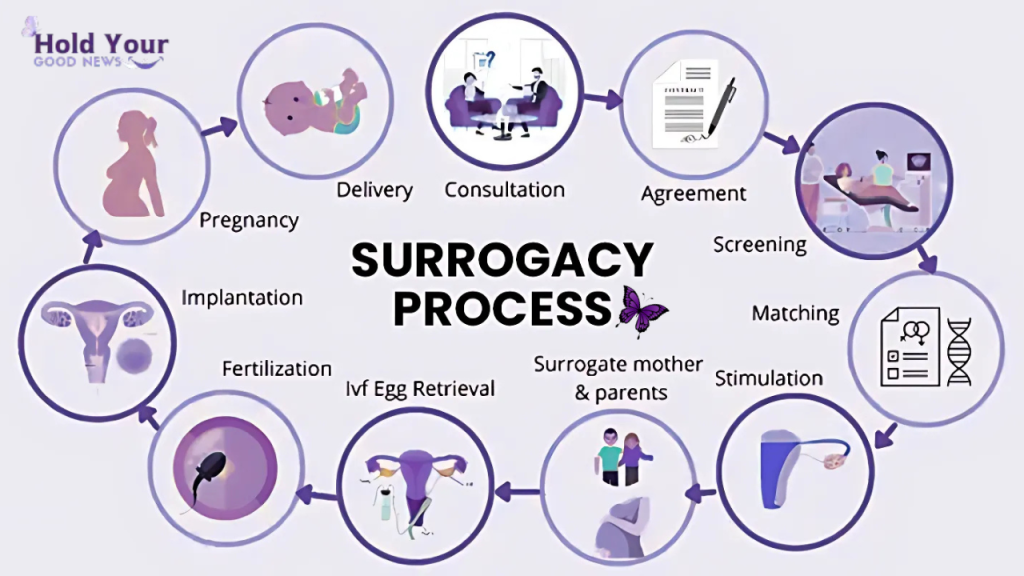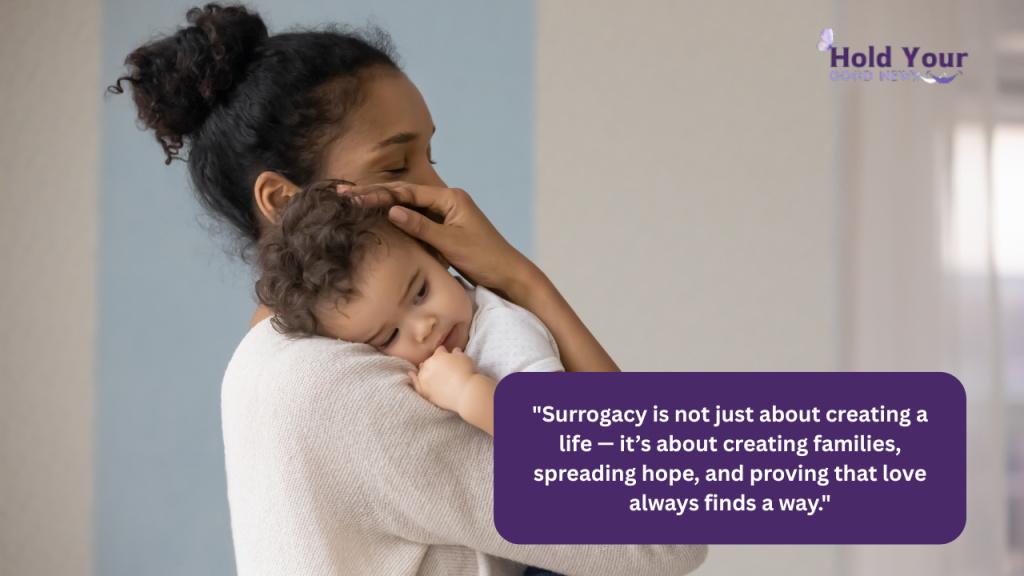Surrogacy Cost in Ghana 2025 : Affordable Options & What Affects the Price

Becoming a parent is a dream that lives in the heart of many. But when the natural path feels difficult, surrogacy gives new hope. If you’re thinking about surrogacy in Ghana, let me explain it to you like a friend — simply and with care. Surrogacy is a beautiful journey where a kind woman (called a surrogate) carries a baby for someone who cannot do it themselves. Ghana is slowly becoming a trusted place for this dream to come true.
Why? Because the surrogacy cost in Ghana is more affordable than in many other countries, and the medical care is safe and respectful. Many intended parents are now turning to Ghana for support, care, and a chance to start their families. In this guide, I’ll help you understand the full cost and process of surrogacy in Ghana — with love, hope, and honest guidance at every step.
What is Surrogacy?
Surrogacy is a special journey where a woman lovingly helps another person or couple become parents by carrying their baby in her womb. It’s not just a medical process — it’s a bond built on trust, hope, and a shared dream of bringing a new life into the world.
There are two types of surrogacy:
- Gestational Surrogacy: The surrogate has no biological link to the baby. The embryo is made using the egg and sperm of the intended parents (or donors) and is placed in the surrogate’s womb. This is the safest and most commonly used method.
- Traditional Surrogacy: The surrogate uses her own egg, which means she is biologically related to the baby. This type is rare and not allowed in many countries.
For couples who have tried everything and still wait for their baby, surrogacy offers real hope — and often, a happy ending.

Surrogacy Process
Surrogacy is a beautiful journey where a woman carries a baby for someone who can’t carry one themselves. Here’s how the process usually goes:
- Choosing a Surrogate: The intended parents find a healthy woman willing to be a surrogate — either through an agency or someone they know.
- Medical & Psychological Screening: Both the surrogate and the intended parents go through health and mental checkups to ensure everyone is ready and safe.
- Legal Agreements: Clear legal contracts are made to protect everyone’s rights, explaining responsibilities and what will happen after the baby is born.
- Fertility Treatment: Usually, IVF is done where the intended mother’s or donor’s egg and intended father’s or donor’s sperm are used to create an embryo in the lab.
- Embryo Transfer: The embryo is carefully placed in the surrogate’s uterus.
- Pregnancy Monitoring: The surrogate receives regular medical care to make sure the pregnancy goes smoothly.
- Birth and Handover: When the baby is born, legal steps are completed to transfer parental rights to the intended parents, who finally get to hold their baby.
Surrogacy is a journey of trust, hope, and love — a true miracle for families who need it most.
Why Consider Surrogacy in Ghana?
Ghana is slowly becoming a ray of hope for many couples dreaming of parenthood. But why choose surrogacy in Ghana? The answer lies in a mix of care, affordability, and growing trust.
First, the surrogacy cost in Ghana is much lower compared to countries like the USA or UK. This makes it possible for more couples to begin their journey without the stress of sky-high expenses.
Second, Ghana has compassionate medical professionals who treat each case with care and dignity. You’re not just another patient here — you’re a family in the making.
Legal processes are also clearer now, giving both intended parents and surrogates a sense of protection and confidence.
Lastly, the warmth and kindness of the people in Ghana make the entire journey more comforting.
If you’re looking for a place where hope meets heart, Ghana is truly worth considering for your surrogacy journey.

What is the Surrogacy Cost in Ghana?
The average surrogacy cost in Ghana ranges between $35,000 to $55,000 USD. This cost includes various components like IVF procedures, surrogate compensation, legal charges, medical care, and more.
Let’s break it down, step by step.
| Service / Component | Estimated Cost (USD) |
|---|---|
| IVF Procedure & Embryo Transfer | $6,000 – $9,000 |
| Surrogate Mother Compensation | $10,000 – $18,000 |
| Antenatal Care & Delivery (Hospital) | $3,000 – $6,000 |
| Legal Documentation & Lawyer Fees | $2,000 – $4,000 |
| Agency or Clinic Coordination Charges | $5,000 – $8,000 |
| Medication & Hormonal Injections | $1,000 – $2,500 |
| Medical Tests & Lab Work | Included above or +$500 |
| Donor Eggs or Sperm (if needed) | $3,000 – $5,000 (optional) |
| Emergency / Unexpected Medical Support | $1,000 – $2,000 |
| Travel, Stay, Miscellaneous | $1,000 – $2,000 |
Table of IVF Treatment in Different Parts of Ghana
| IVF in Ghana (City-wise) | Cost of IVF in Ghana (USD) |
|---|---|
| IVF Cost in Accra | $3,500 to $5,000 |
| IVF Cost in Kumasi | $3,200 to $4,800 |
| IVF Cost in Tamale | $3,000 to $4,500 |
| IVF Cost in Takoradi | $3,300 to $4,700 |
| IVF Cost in Cape Coast | $3,200 to $4,600 |
| IVF Cost in Sunyani | $3,000 to $4,500 |
| IVF Cost in Koforidua | $3,100 to $4,400 |
| IVF Cost in Tema | $3,400 to $4,900 |
| IVF Cost in Ho | $3,000 to $4,200 |
| IVF Cost in Bolgatanga | $3,000 to $4,300 |
| IVF Cost in Wa | $3,000 to $4,300 |
| IVF Cost in Obuasi | $3,100 to $4,500 |
Factors That Can Affect Surrogacy Cost in Ghana
When planning for surrogacy, it’s natural to ask, “How much will it really cost?” While Ghana is known for offering more affordable surrogacy options, the total cost can vary depending on a few important things. Let me explain it to you like a friend, step by step:
Accommodation & Travel – For international or out-of-city parents, living arrangements and travel may add to the total expenses.es can actually save you money in the long run, by avoiding failed cycles or hidden costs.
Type of Surrogacy – Gestational surrogacy (where the surrogate has no genetic link to the baby) usually costs more than traditional surrogacy due to IVF and lab procedures.
Medical Treatments & IVF Cycles – If multiple IVF attempts are needed, the cost can increase. Success in the first try can reduce expenses.
Surrogate Compensation – Surrogates are paid for their time, effort, and care. Their experience or health conditions may affect the fee.
Legal & Agency Fees – Hiring a surrogacy agency or lawyer for legal paperwork and coordination adds to the cost but ensures safety.
Screenings & Medications – Fertility tests, medications, and prenatal care are essential and included in the final amount.
Delivery & Hospital Charges – The hospital chosen for delivery, any complications, or NICU support can increase costs.
Multiple Pregnancy – If the surrogate carries twins or triplets, costs go up due to extra care and risk management.

Is Surrogacy Legal in Ghana?
Currently, Ghana does not have a specific surrogacy law, but the process is not illegal either. It is practiced under contract law, meaning the agreement between intended parents and surrogate mother is legally binding as long as both parties agree freely and with full understanding.
The child is typically registered under the names of the intended parents. But always work with clinics that have experienced legal teams to avoid complications.
Who Can Go for Surrogacy in Ghana?
Surrogacy in Ghana is an option for:
- Couples facing infertility
- Women with absent or defective uterus
- Women with severe medical conditions making pregnancy risky
- Single individuals or LGBTQ+ couples (depending on clinic policies)
If you’re medically or physically unable to carry a child, surrogacy can help you fulfill your dream of parenthood.
How Do I Choose a Surrogacy Centre in Ghana?
When I counsel patients, I always tell them—don’t just go for the cheapest. Choose a clinic that:
- Has experienced fertility specialists
- Maintains ethical surrogate selection
- Offers transparent cost packages
- Provides legal assistance
- Has positive reviews or patient success stories
How Can Hold Your Good News Help You?
“Hold Your Good News—Take Care of your parenthood journey with the help of us”
Your smile is important to us! We make sure to give the best possible services, as our patients are our top priority at Hold Your Good News. Because our team of qualified specialists uses advanced equipment, the treatments we provide are both effective and accurate. Our clinic provides complete dental work, cosmetic surgery, and even fertility treatments, all of which are done through effective and customized treatment plans.
We are transparent and trustworthy. As such, we do not charge for additional hidden costs. We are proud to say that we have thousands of happy patients thanks to our medical ethics and high success rates. All of our ultra-modern clinics are designed to be stress-free and comfortable so that every visit is as easy and pleasant as possible.
Treatment is only a part of our service. We provide complete care with long-term assistance. All patients are cared for with respect and compassion, which is why we continue to strive to innovate in our field, claiming our prize for the best healthcare service.
Final Words – A Message from the Heart
Choosing surrogacy is a brave and beautiful decision. It takes strength to trust someone else to carry your child, and it takes even more strength to walk this path with hope.
If you’re considering surrogacy in Ghana, you’re not only choosing an affordable and medically safe option, but also taking a step closer to holding your little one in your arms.
I hope this article has answered your questions about Surrogacy Cost in Ghana, and more importantly, made you feel confident and supported.
Remember, becoming a parent is not always a straight path—but it’s always worth the journey.
Warm wishes for your future family,
FAQs
Q1. Is surrogacy legal in Ghana?
Yes, surrogacy is practiced legally in Ghana even though there isn’t a dedicated surrogacy law in place. It is usually carried out based on legal contracts between the intended parents and the surrogate mother. These contracts clearly mention the rights, responsibilities, and compensation, helping ensure safety and clarity for both parties. Reputed fertility clinics also ensure all legal aspects are handled properly to protect everyone involved.
Q2. Can foreigners opt for surrogacy in Ghana?
Yes, foreign intended parents can absolutely choose surrogacy in Ghana. In fact, many fertility clinics in Ghana are well-equipped to handle international cases and have experience working with patients from countries across Europe, America, and other parts of Africa. They often offer online consultations, English-speaking staff, and full support with travel, accommodation, and documentation — making the process smooth and welcoming for international families.
Q3. What is the success rate of surrogacy in Ghana?
The success rate for surrogacy in Ghana is quite promising. Thanks to modern IVF technology, experienced doctors, and advanced fertility labs, the success rate is usually around 60–70% per embryo transfer. This means that out of every 10 embryo transfers, 6 to 7 result in a successful pregnancy. The chances may improve further with good-quality embryos, healthy surrogates, and personalized care.
Q4. Can I choose the gender of the baby?
In Ghana, gender selection is generally not allowed unless it’s for medical reasons, such as avoiding a hereditary disease linked to a specific gender. Ethical and legal guidelines usually discourage gender selection for non-medical purposes. However, each clinic may have its own policy, so it’s best to discuss this directly with your chosen fertility center for the most accurate and legal advice.
Q5. Are the surrogates well taken care of?
Yes, at reputable clinics, surrogate mothers receive complete care and support throughout their journey. This includes:
Regular medical check-ups and prenatal care
Counseling sessions to ensure emotional well-being
Comfortable housing if needed, especially for surrogates from rural areas
Nutritious meals and supplements to maintain a healthy pregnancy
Fair compensation for their dedication and time
Latest Post:
- IVF Cost in Siliguri 2025 – Affordable Treatment & Best Options
- IVF Cost in Nepal 2025 – Affordable & High-Success Fertility Treatment
- IVF Cost in Delhi 2025 – Discover Affordable & Trusted Options for Happy Results
- PGD Cost in Georgia 2025 : Your Guide to Hope and Healthy Beginnings
- Embryo Freezing Cost in Georgia – A Hopeful Pause on Your Path to Parenthood




